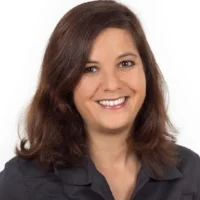CLAUDIA'S BIO
As the Chief Scientist at Dstillery, Claudia Perlich leads the machine learning efforts that help target consumers and derive insights for marketers. With more than 50 published scientific articles and numerous awards, she is a widely acclaimed expert on big data and machine learning applications, and an active speaker at data science and marketing conferences. Prior to joining Dstillery in 2010, Claudia worked at IBM’s Watson Research Center, focusing on data analytics and machine learning. She holds a PhD in Information Systems from New York University (where she continues to teach at the Stern School of Business), and an MA in Computer Science from the University of Colorado.
WITH GROUPS CREATING PROGRAMS TO ENCOURAGE FEMALES TO CONSIDER STEM, WHAT IS THE BIGGEST BARRIER TO ENTRY THAT IS STILL PREVALENT TODAY?
Ever since people started to ask me these types of question (maybe 5 years ago), I have had problems answering. My personal sense is that the term ‘barrier’ is really misleading and possibly harmful. Words as well as stereotypes affect the way we see the world. I fear that the more we debate ‘barriers’, the more we make them appear real to young women - as if making a career in STEM is more of an uphill battle than making a career in general. I am simply utterly convinced that the capacity to succeed in STEM really rests in all of us as individuals, male and female. Ok, maybe there was something vaguely odd about being one of 5 women in a room of 200 CS majors. But not nearly as odd as being the one teenager in my class who did not like to go to parties. I wish I had known then, that we probably all feel out of place at times and that in my particular case it was the early manifestations of being an introvert.
Looking back at it, I feel that I struggled for a good while to live up to some vague social expectations - and whenever I tried, I just could not be that person and I felt terrible, wondering what was wrong with me! And so maybe that is really what these barriers are - some vague social expectations of what a girl is supposed to be like. And I am not talking about career here, but about the much earlier norms that we grow up with when we are as young as 3. I can recall my granddad telling me when I was maybe 12 and my mom had forced me into a dress for some family event “Na vielleicht wird ja doch noch eine Lady aus Dir!” - “Well maybe you will turn into a lady after all!”. Not that I cared much about his opinion - I cared about being liked by my peers. And while the boys in my class had some appreciation for my ability to climb trees and retrieve the frisbee that got stuck up there, it did not get me many brownie points with the girls.
Today I am raising a boy here in the US. What strikes me in the context of this conversation is how much stronger childhood stereotyping is here, than it was in East Germany where I grew up. We did not have princess castle vs. batman lego sets, Dora series vs. Diego.
When I am talking to young women who contemplate entering the field, I often feel that what might help them the most is some more confidence into who they are. That it is ok, to be different, that it is OK to not be the best in math and still be able to love science, that they should not doubt themselves over what they perceive as them falling short of some stereotype of a successful person in STEM.
WHAT OR WHO INSPIRES YOU?
Inspiration is a word I hardly use - there is in fact not really a good German equivalent that carries the same meaning. And so even after living in the US for nearly 20 years, it sounds like some big external thing - which I do not have or feel I need. In a more narrow sense, what inspires me is a good problem, a worthy challenge. Not for any big reason other than the fact that I enjoy trying to figure things out and I certainly get some pride out of my own ability to do stuff - some feeling of accomplishment.
Are there people who I respect deeply? Absolutely! And maybe what inspires me was not so much the goal to become like them, but rather to be worthy of their respect for who I am in return.
WHAT IS YOUR PROUDEST MOMENT/ACCOMPLISHMENT?
This is another one that I find really hard to answer. But maybe in the context of the conversation I would like to say that I am really grateful about being (finally) fully comfortable with who I am - all the different things I am, some good and some not so good: somebody who really loves to geek out about weird mathematical puzzles, somebody who is OK with being unable to remember names, somebody who ends up binge watching some rather stupid show for 3 nights in a row, somebody who in a social event will seek moments of solitude without pondering what might be wrong with me, somebody who can appreciate that others are better at many things without feeling bad, and even somebody who can accept that I am occasionally been treated favorably BECAUSE I am a women without feeling insulted.

